Our Little Sister
| Our Little Sister | |
|---|---|
 Poster | |
| Directed by | Hirokazu Kore-eda |
| Screenplay by | Hirokazu Kore-eda |
| Based on | Umimachi Diary by Akimi Yoshida |
| Produced by |
|
| Starring | |
| Cinematography | Mikiya Takimoto |
| Edited by | Hirokazu Kore-eda |
| Music by | Yoko Kanno |
Production companies |
|
| Distributed by |
|
Release dates |
|
Running time | 126 minutes |
| Country | Japan |
| Language | Japanese |
| Box office | ¥1.55 billion[1] |
Our Little Sister (Japanese: 海街 diary, Hepburn: Umimachi Diary, lit. "Seaside town diary") is a 2015 Japanese drama film directed by Hirokazu Kore-eda and based on Akimi Yoshida's manga series Umimachi Diary. It stars Haruka Ayase, Masami Nagasawa, Kaho and Suzu Hirose. The film follows three sisters living in Kamakura, alongside their half sister.[2] It was selected to compete for the Palme d'Or at the 2015 Cannes Film Festival.[3][4]
Plot[edit]
Three sisters, Sachi Kōda, Yoshino Kōda and Chika Kōda, live in the house of their grandparents in Kamakura. Their parents are divorced. One day, they receive news of the death of their father, whom they have not seen in fifteen years. At the funeral, they meet their half-sister, fourteen year old Suzu Asano. Suzu is living with her stepmother and stepbrother. Observing the behaviour of the stepmother at the funeral (she tries to pass on the responsibility of addressing the guests to Suzu), Sachi guesses that Suzu looked after their father as he died, not the stepmother. At the train station Sachi spontaneously invites Suzu to come and live with them. Suzu joins the local football team and becomes popular as the relationship develops.
Cast[edit]
- Haruka Ayase as Sachi Kōda
- Masami Nagasawa as Yoshino Kōda
- Kaho as Chika Kōda
- Suzu Hirose as Suzu Asano, the Kōda's younger half sister
- Ryo Kase as Sakashita, Suzu’s soccer coach in Kamakura
- Kentaro Sakaguchi as Tomoaki Fujii
- Ryohei Suzuki as Yasuyuki Inoue
- Takafumi Ikeda
- Ōshirō Maeda
- Midoriko Kimura
- Kirin Kiki as Fumiyo Kikuchi
- Jun Fubuki as Sachiko Ninomiya, a cafe owner
- Lily Franky as Sen-ichi Fukuda
- Shinichi Tsutsumi as Kazuya Shiina, a married doctor who is having an affair with Sachi
- Shinobu Otake as Miyako Sasaki, the mother of Sachi, Yoshino and Chika

Production[edit]
The film was produced by Fuji Television, Shogakukan, Toho and Gaga Corporation.[5] Principal photography began in July 2014.[6]
Release[edit]
The film premiered at the 2015 Cannes Film Festival. The film was released in Japan on June 13, 2015.[7] It premiered in London, England on October 14, 2015 as part of the BFI London Film Festival[8] It was released in South Korea in 2016.
Box office[edit]
The film has grossed ¥1.55 billion in Japan.[1]
Critical response[edit]
Rotten Tomatoes reports a 94% approval rating for Our Little Sister, based on 123 critics, with an average score of 7.8/10. The website's critical consensus reads: "Our Little Sister uses the story of one fractured family to offer universal -- and deeply moving -- observations on the human condition."[9] The film also holds a 75/100 average rating on Metacritic, based on 31 critics, indicating "generally favorable reviews".[10] Steven Rea of The Philadelphia Inquirer gave it a full four stars and said that "this is the kind of movie that will leave you feeling restored, maybe a little misty-eyed as well".[11] Calvin Wilson of St. Louis Post-Dispatch referred to it as "a beautiful drama with comedic undertones about the tension between the comforts of family life and the vast possibilities beyond it. [...] an insightful film that bears comparison to the work of British directors Mike Leigh and Ken Loach."[12]
A. O. Scott of The New York Times praised the film's plot: "Seeming to wander through small incidents and mundane busyness, it acquires momentum and dramatic weight through a brilliant kind of narrative stealth." He said the film "goes down as easily as a sip of the plum wine the sisters brew and yet leaves the viewer both sated and intoxicated."[13] Kenji Fujishima of The Village Voice found the film less powerful than Kore-eda's Still Walking (2008) and Like Father, Like Son (2013), writing that the film has "an emotional reticence that at times verges on too subtle for its own good. [...] moments of bitterness and anguish don’t quite have the gut-punch impact they ought to have." Still, Fujishima commended the acting and also lauded one scene as showing "the laudable humanity at the heart of Kore-eda’s patient, warmhearted worldview".[14]
It was Christian Blauvelt's choice in IndieWire's 2018 list of the best Japanese films of the 21st century, with Blauvelt writing that "Kore-eda doesn’t delve into the histrionics usually involved with depictions of “broken families” in American films – these young women know they have to make do, get on with life, and leave the self-pity behind."[15]
Accolades[edit]
Our Little Sister received the most nominations (12) at the 39th Japan Academy Prize, winning four of them including Picture of the Year and Director of the Year. The four actresses who portrayed the sisters were all awarded or nominated for the acting awards (Haruka Ayase was nominated for Outstanding Performance by an Actress in a Leading Role, Masami Nagasawa and Kaho were nominated for Outstanding Performance by a Supporting Actress in a Leading Role and Suzu Hirose won Newcomer of the Year).[16]
The film also won Audience Award at San Sebastián International Film Festival.[17]
Our Little Sister
Directed by Hirokazu Kore-eda
A masterwork by Japan's foremost director of miniature films suffused with beauty, everyday spirituality, and subtle grace.
Our Little Sister
Directed by Hirokazu Kore-eda
A masterwork by Japan's foremost director of miniature films suffused with beauty, everyday spirituality, and subtle grace.
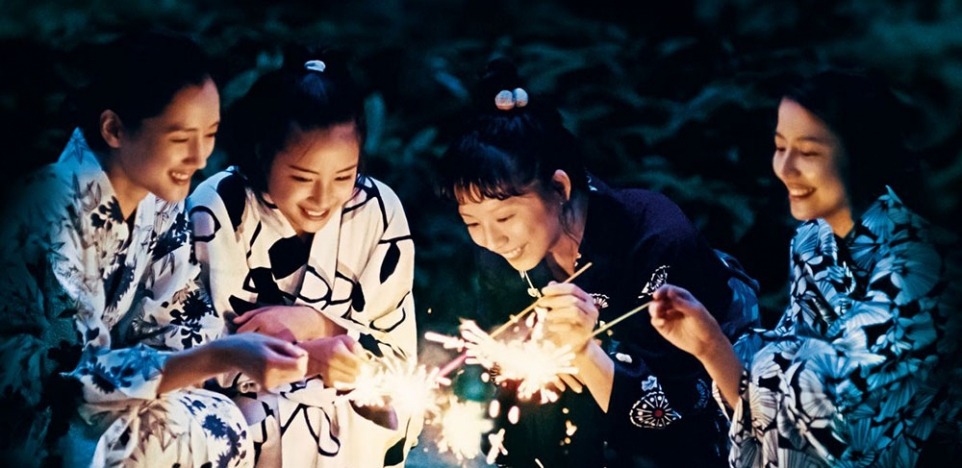
Film Review by Frederic and Mary Ann Brussat
TwitterFacebookLinkPrint
Three sisters live together in their grandmother's house in a seaside town in Japan. It is a soulful place where they talk, laugh, eat, drink, and pray in front of their ancestral shrine. They are in sync with the natural world and with the seasons. These young women were abandoned by both parents; first their father left home after falling in love with another woman and then their mother (Shinobu Ohtake) walked out on them. The sisters reformed as a new family and have survived by bonding together with subtle grace and supple love.
Sachi (Haruka Ayase), the oldest and most responsible one, has taken on the role of surrogate mother. Yoshino (Masami Nagasawa) is the pretty one who dates a variety of men and is a party girl. Chika (Kaho) is the youngest, a happy camper who has a sense of humor and a playful spirit. They all have jobs. Sachi is a head nurse; Yoshino is an officer at a bank; and Chika is a sporting goods manager.
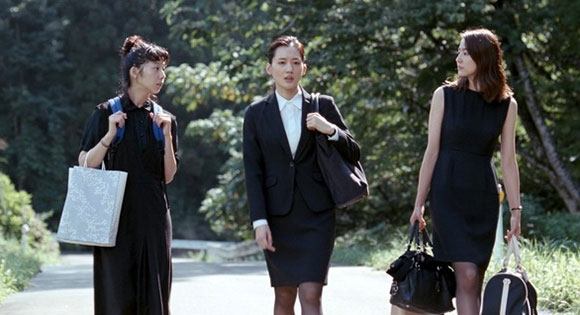
None of them knew their father very well – they think of him as "kind" and "useless." But out of duty they attend his funeral in another city. There they meet Suzu (Suzu Hirose), the adolescent daughter of their father's second marriage. They are impressed with her maturity, sweet disposition, and beauty. They realize it was this younger sister who took care of their father when he was dying, but now is not close to her step-mother. Everyone is happy when Sachi invites Suzu to come live with her sisters and she agrees.
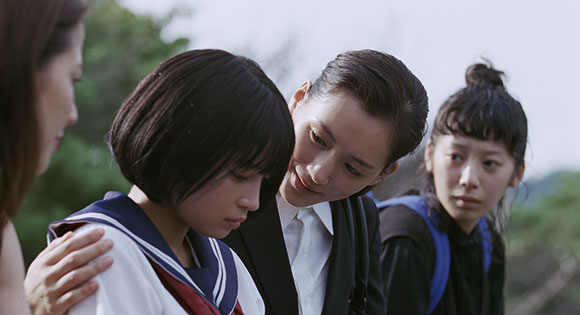
The addition of Suzu to the family works wonders for them all. Sachi, Yoshino, and Chika make her feel right at home. Suzu blooms before their eyes. At school, she becomes a star on the soccer team and makes lots of friends. She is warmly accepted in the community and wins the affection and admiration of the kind-hearted woman (Jun Fubuki) who runs a cafe where the sisters have gone for many years.
In her first encounter with her half-sisters, Suzu leads them up a steep hill and shares with them a panoramic view of the countryside that she used to share with their father. Later Sachi shows her a similar view that she remembers seeing with their father when she was a child. All the sisters have mixed feelings about their parents. The older ones constantly assure Suzi that it is not her fault that her mother destroyed their family.
Suzu's communion with the natural world is an added blessing to the acceptance she discovers in her new community. In the most memorable of the many tributes to beauty in the film, a boy takes Suzu on a bicycle ride under a row of cherry blossom trees in full bloom. Her own private moment of connection with nature comes after finishing a bath when she steps outside and opens her towel to sense the air on her bare skin.
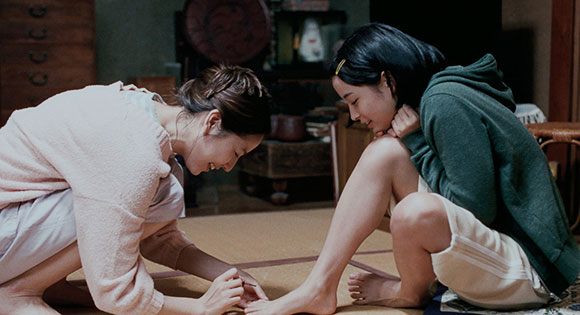
In the six films Hirokazu Kore-eda has directed, he has created an astonishing collection of stories which touch the heart and revere the manifold mysteries of life. Searching for a genre to place his work under, we came up with the idea of calling them "miniature films." These dramas reflect Kore-eda's attention to the little details of everyday life and the minutia of intimate relationships and family interactions. Events move slowly so you have time to notice subtle things that are happening. The director's love of fashioning art in the small has not diminished over the years.
We were moved by Maborosi, a powerful and profound drama about one woman's long and arduous journey through grief's labyrinth.
Our favorite of his films is After Life, an exquisite story in which people who have recently died are given the chance to choose the memory of the best day of their life to carry with them into eternity.
Nobody Knows tells the harrowing story of four children in Tokyo who are abandoned by their mother and forced to fend for themselves.
In Still Walking, the director turns his focus on a Japanese family get-together to explore sibling rivalry, the yearning to be wanted, and the mysteries of death.
I Wish is a charming and inventive drama about wishes, friendship, sibling solidarity, and the wonderful support of grandparents when we need them most.
Like Father, Like Son explores the slow and surprising transformation of a self-absorbed and distant father who comes to see how important it is for both children and parents to be loved and appreciated.
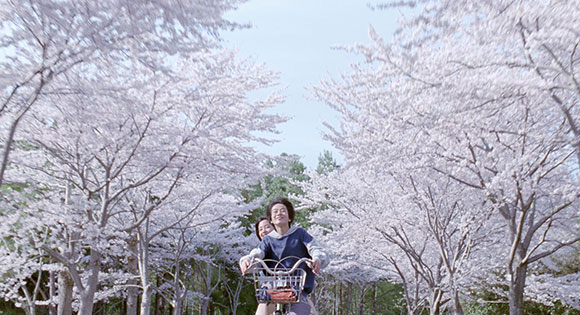
The themes of these earlier Hirokazu Kore-eda films are present in this new one – the importance of family relationships over time, the transformative power of memories, and the yearning for acceptance and love. The three sisters are connected to their late grandmother who looked after them following their mother's departure. They introduce Suzu to the art of making of wine with plums from the old tree in the garden using their grandmother's recipe. Time and tradition can be prisons for many but for these sisters they are reservoirs of meaning and sustenance.
When the moment comes to say goodbye to these four sisters, it is hard to describe our feelings. There is our gratitude for the beauty we have witnessed on the screen in the faces and presence of these immensely talented actresses. There is also the pleasure that is derived from the gentle and caring ways in which the characters do their everyday chores in their home. Here little things matter and the sisters do them with such love that it takes away our breath to see how graceful and natural this lifestyle can be. And last but not least, we recall how in their nurturing of each other and Suzu they heeded the wise words of their grandmother: "Every living thing takes time and effort."
No comments:
Post a Comment